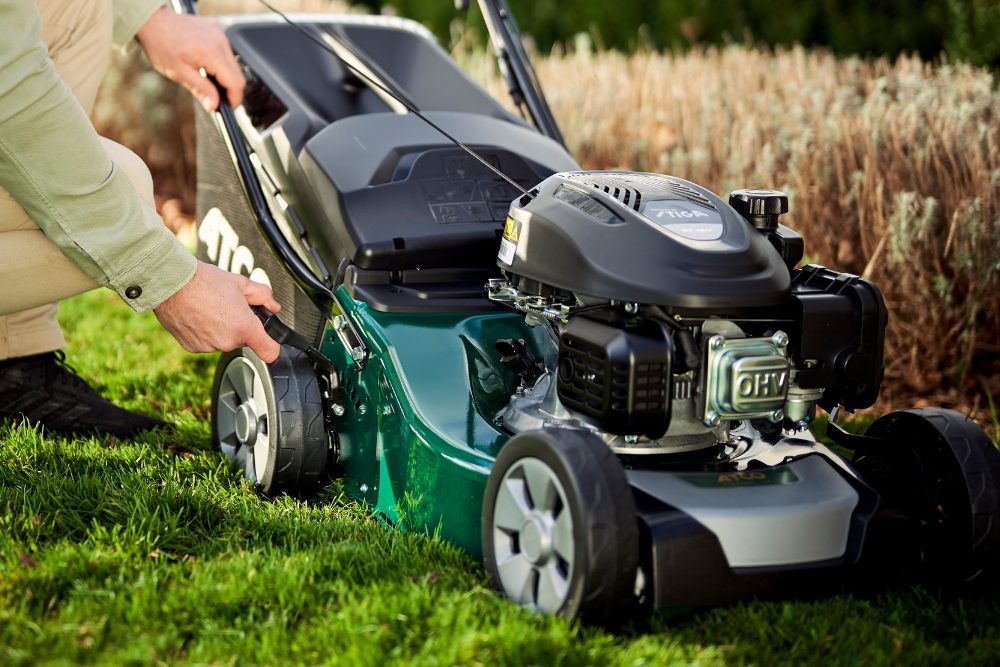Your lawn mower is arguably the most important garden tool in your shed or garage. Keep it in tip-top condition with our helpful lawn mower care and maintenance guide:
- When you purchase your new lawn mower make sure to familiarise yourself with the instructions and advice in the operator guide supplied with your machine.
Lawn mower care for petrol mowers:
Always use clean fresh fuel which has ideally been treated with Fuel Stabiliser. Petrol starts to go stale approximately 30 days from purchase and will cause running issues in your machine. By adding fuel stabiliser to freshly purchased petrol it will stay fresh in your petrol can for up to 2 years. You can purchase fuel stabiliser from most garden centres and lawn mower shops as well as online.
- Adhere to the service schedule that appears in the engine manual supplied with your mower. For extended warranty periods of 3 and 5 years, it is normally a requirement to have your mower serviced by an approved dealer before the end of the second year and then each year thereafter. Service items such as oil, spark plugs and air filters should be periodically replaced.
- Do not tip your mower onto its side, lawnmowers should only be tilted backwards. Tilting the machine onto its side can cause oil to ingress the cylinder, carburettor and exhaust which can cause starting problems and in serious cases damage to the internal parts of the engine.
Check the oil level before each use and top up accordingly. There is a dipstick attached to the oil filler cap, this has two indicators marked upon it which show you the correct oil level. For more information refer to your engine manual.
Lawn mower care for all mowers:
- Before you start mowing, inspect your lawn for debris that may cause damage to your mower. Even innocuous objects such as rubber balls and string can cause serious damage to parts of the machine.
- Periodically check all nuts, bolts and screws for tightness. Using the mower with loose fastenings and fixings can also cause damage.
- Regularly inspect the cutter blade. Damaged and imbalanced blades can cause vibration which in turn can damage the engine, deck and handles.
- Do not overwork your lawnmower. If your lawn has grown longer than usual it may be necessary to raise the cutting height for one pass before going back over the lawn at the desired (lower) cutting height.
- For petrol machines: Avoid mowing under bushes and plants as this can cause damage to the carburettor mechanism.
- If mowing on bumpy or uneven ground it may be necessary to raise the height of cut. If the blade hits the ground the engine and self-propelling mechanism can be damaged.
- After each use remove grass pulp from the underside of the cutter deck. Before going underneath the mower always remove the spark plug lead. Grass pulp can be removed with a non-metallic item such as a plastic spatula or a stiff nylon brush. If your mower is fitted with a washing link you can simply attach a hose and wash the underside of your mower. (Check your mower’s manual for instructions)
- If you prefer to fold the handle down for storage, be careful not to snag the pull cord or cables.
- For petrol mowers: If you anticipate not using your mower for 28 days or longer (for example storing over winter) lubricate moving parts and drain fuel from the tank and carburettor. Modern petrol now typically contains 10% ethanol (E10). Ethanol readily bonds with atmospheric moisture creating an ethanol-water mix which accelerates the process that degrades fuel. This is commonly referred to as ‘stale fuel’. ‘Stale’ fuel can cause serious damage to the engine and stop your mower from working.
- For battery-operated mowers: It is important to store your machine and batteries in a cool, dry place. Periodically recharge your batteries over winter or long periods without use in order to keep them healthy.
- Remember to store your mower in a dry area out of the elements. Do not hang your mower via its handlebar or store it vertically (unless your mower is a ‘stow and mow’ or similar model designed to be stored this way – see your user guide for storage info.)
- If you suspect or discover your mower has a fault or breakage discontinue using the machine and seek immediate advice from the manufacturer’s helpline (often this is written on a sticker on your mower). Using a lawn mower with a known fault or breakage can cause damage to other parts and may void your warranty.
With a little ‘lawn mower’ care and attention, you can ensure your lawnmower remains ‘King or Queen of the garden shed’ and in tip-top condition for many years to come.


